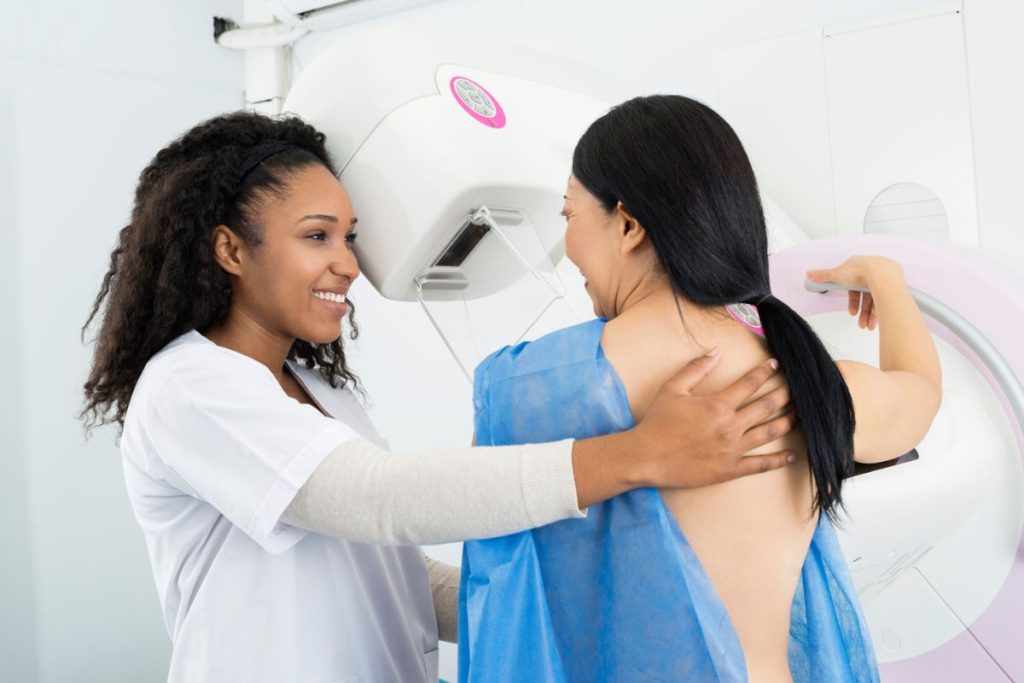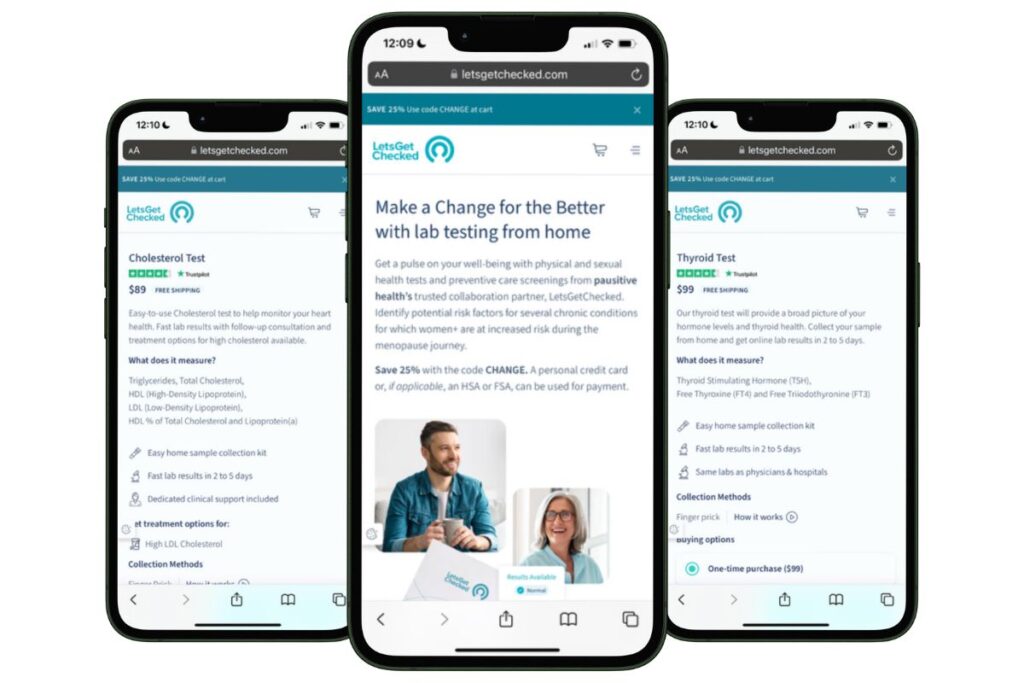If I had known I was going to live so long, I'd have taken better care of myself.
~ Eubie Blake
When was the last time you had an annual visit with your OB-GYN, internist, or family practitioner? If it’s been more than a year, it’s time to see your doctor. These yearly visits are critical for healthy aging. During the menopause transition, your health is more important than ever as it can impact your symptoms. You also want to identify risk factors for chronic conditions and detect cancer as early as possible to provide you with the best chance for an optimal outcome.
Is there a secret to longevity?
Women are living longer than ever, according to the Centers for Disease Control (CDC). The average life expectancy is 80 (79.9) years, and that’s three years longer than men.
However, life expectancy is 20 years less than women and men living in a Blue Zone region. These are areas of the world where people typically live to 100.
Healthy aging is the norm in Blue Zones because:
- People don’t smoke.
- They put family first.
- They participate in physical activity every day.
- They have strong connections with friends, family, and the community and engage socially.
- They eat fruits, vegetables, and whole grains.
Everyone wants to know the secret to longevity. While magazine covers will have you thinking we’ve finally found the answer, the reality is the secret is perhaps the worst-kept one. It’s what we’ve known for decades and what the Blue Zones teach us – maintain a healthy lifestyle.
When you have a healthy lifestyle, you minimize the risk of chronic conditions and are in a better position physically and mentally if you become ill.
Even if you begin later in life, exercise can improve your heart function, according to the Baltimore Longitudinal Study of Aging (BLSA).
Leading a healthy lifestyle means eating better, being more active, and getting preventive health screenings. Something many people skip! An Aflac survey of employed adults found:
- half of adults avoided at least one health screening
- 1 in 4 miss routine checkups
These screenings can pick up on abnormalities and help you live a longer life by catching chronic diseases and cancers early.
In fact, of those in the survey who said they had cancer, 72% of Hispanic respondents found out as a result of a routine checkup or screening.
Menopause and healthy aging
Healthy aging is connected to your wellness during the menopause journey. However, a HealthyWomen and WebMD poll shows women don’t associate the management of menopause symptoms with healthy aging.
When women were asked how they’d describe “healthy aging,” managing menopause symptoms was at the bottom of the list, with only 36% of women+ mentioning that.
Most women were focused on food and exercise.
While those lifestyle factors are critical, menopause impacts a woman in many ways. Symptoms can affect a woman from head to toe. Will you let them control you, or will you control the symptoms?
Women+ should take action during menopause. There are ways to manage symptoms with non-hormonal medication, non-hormonal techniques, and hormone therapy.
While management of symptoms is critical during the menopause journey, women+ also need to understand how this natural stage of life puts them at increased risk for certain health conditions. It increases a woman’s risk for depression, cardiovascular disease, osteoporosis, and potentially dementia.
As much as we talk about preventive care like cancer screenings and mammograms, menopause should be part of that conversation. It can feel like a marathon when you’re experiencing hot flashes several times a day for years. Symptoms can last up to 10 years!
Menopause is a marathon; just like you’d train your body for a marathon, you should also prepare for menopause. Your body will thank you.
Why preventive care matters
While the vast majority of women self-report they’re in good health, 16% are in fair or poor health, according to the Kaiser Family Foundation. When you segment for race and ethnicity, the numbers are worse for Black and Hispanic women. 28% of Hispanic women and 20% of Black women report fair or poor health.
As you age, health risks can increase, in addition to how menopause already increases your risk for certain conditions. Heart disease and cancer are the most significant risk as you age, followed by stroke, chronic lower respiratory diseases, Alzheimer’s disease, and diabetes.
Over time, these chronic conditions affect your mortality. They also add stress to your body and may limit your physical activities, further limiting your ability to stay as healthy as possible.
The Healthy Women and WebMD poll also showed women+ are not talking to their doctors about these increased risks and health concerns.
Heart disease was the condition most women talked to their doctor about, with a quarter of menopausal and postmenopausal women discussing it, according to the HealthyWomen and WebMD survey.
Women also need to be concerned about common illnesses, like pneumonia and flu. They’re the seventh leading cause of death in adults 65 and older, even though vaccines can help prevent them. They’re not 100% effective, but they deliver a strong shot of protection.
Preventive screenings can detect cancers and chronic conditions early, so you have a better chance of a positive outcome.
Only 13% of menopausal women talked to their doctor about cancer,

Preventive care screenings you need
Preventive care services, like annual check-ups and well-woman visits, are an essential part of the prescription for healthy aging. They can catch certain cancers early, giving you a better chance of living a long, healthy life.
Yet, many women put off these vital screenings even though most insurance plans cover these at no cost.
The Kaiser Family Foundation’s 2022 Women’s Healthy Survey found that:
- 33% of women did not get a pap smear or pap test in the last two years.
- 38% of women aged 45-64 had a colon cancer screening in the past two years.
- 10% of women had no personal doctor or healthcare provider (2021 data)
The numbers, in some categories, are far worse when you consider race. For example, more than twice as many Hispanic women (23%) do not have a doctor.
Women of color often can have different menopause journies than their white counterparts, including more severe or intense symptoms. So, find a doctor you can trust to help you manage symptoms.
Women+ do seem to be getting mammograms, according to the Kaiser Family Foundation. And, Black women are most likely to get one, with 86% reporting a mammogram in the last two years. 75% of white women had a mammogram.
Women+ who did not get a mammogram said they didn’t think they needed one or didn’t realize they were due for one.
Fewer than half of adults 65 years of age and older are up to date on core preventive services, even if they receive a regular checkup, which would suggest a combination of healthcare providers not tracking and recommending these preventive measures as effectively as they should and patients not following through on the recommendations when they are made.
Although the COVID-19 pandemic has definitely impacted these findings, adherence to preventive care guidelines, in general, has been suboptimal for decades, particularly in areas like colorectal cancer screening.
In general, women should talk to their doctor about these :
- Annual flu
- Pneumonia vaccine
- Mammogram*
- Two doses of the Shingles vaccines
- Colorectal cancer screening
- Pap test
- Tdap shot or booster
- Type 2 diabetes screening
- Bone density
- Eye exam
- Cholesterol screening
- Blood pressure
- COVID vaccine and booster
- Skin check
Some of the recommendations vary depending on the medical entity, your particular situation, and your family history. They may also volve over time as research points to the need for changes.
Things can get complicated, so talk with your doctor to determine preventive care services screenings applicable to your age and health.
There may be additional screenings recommended by your doctor based on your health and history. For example, you may get a screening for lung cancer, depression, or hearing.
Take control of your health
It’s never too late to take control of your health. What you do today can impact you ten years later.
A healthy lifestyle can help you manage menopause symptoms, reduce your risk of health conditions later in life, and potentially improve your outcome if you become ill.
But, that’s not the only secret to longevity. Preventive care is also important.
Far too many women are skipping them, putting themselves at unnecessary risk for medical issues too late to improve the outcome.
Don’t take your health for granted. Be proactive and give yourself the best possible shot of living life like those in Blue Zones!

Discounted At-Home Lab Testing
Convenient & Confidential
Preventive care is important during the menopause journey because the hormonal transition increases your risk of chronic conditions related to both your physical and mental health. Get an easy-to-use at-home lab test(s) delivered in discreet packaging, from our collaborative partner LetsGetChecked. Follow-up with a clinician for abnormal test results, and telehealth is available to assess your health and need for prescriptions and treatment.
For 25% off the tests, use code “pausitive” at checkout.
If you order at-home lab testing, we may receive a small commission.
Mortality in the United States, 2020 | Centers for Disease Control and Prevention
Too many U.S. Adults Are Skipping Wellness Appointments That Can Help Save Their Lives | Aflac
Talbot LA, Morrell CH, Metter EJ, Fleg JL. Comparison of cardiorespiratory fitness versus leisure time physical activity as predictors of coronary events in men aged < or = 65 years and > 65 years. Am J Cardiol. 2002 May 15;89(10):1187-92. doi: 10.1016/s0002-9149(02)02302-0. PMID: 12008173.
Aging Smart, Aging Well | WebMD and Healthy Women
Women Who Report Fair or Poor Health Status by Race/Ethnicity | Kaiser Family Foundation
Koene R, Prizment A, Blaes A, and Konety S. Shared Risk Factors in Cardiovascular Disease and Cancer. Circulation. 2016; Volume 133, Number 11. https://doi.org/10.1161/CIRCULATIONAHA.115.020406
2022 Women’s Health Survey | Kaiser Family Foundation
Many Women Use Preventive Services, but Gaps in Awareness of Insurance Coverage Requirements Persist: Findings from the 2022 KFF Women’s Health Survey | Kaiser Family Foundation
Women Who Report Having No Personal Doctor/Health Care Provider by Race/Ethnicity | Kaiser Family Foundation
Bolen J, Shenson D. Routine Checkups Don’t Ensure That Seniors Get Preventive Services. The Journal of Family Practice. 2011 January;601(1):E1-E10.
What You Can Expect After Getting Shingrix Vaccine Fact Sheet | Centers for Disease Control and Prevention
You may also like…

What You Need to Know About the Musculoskeletal Syndrome of Menopause
Feeling new joint pain even though you don’t have an injury? Musculoskeletal syndrome of menoapuse can cause aches and pains. Get treatment.

Why Am I So Forgetful? Could It Be Dementia Or Is It Menopause?
Are you feeling forgetful or having trouble concentrating? Learn the difference between brain fog and dementia, and how to help prevent dementia.

28 At-Home Osteoporosis Exercise Videos To Help Prevent or Manage It
Try these at-home osteoporosis exercise videos from our collaborative partner. They can help prevent or manage osteoporosis and osteopenia.

